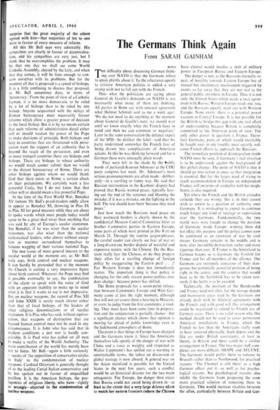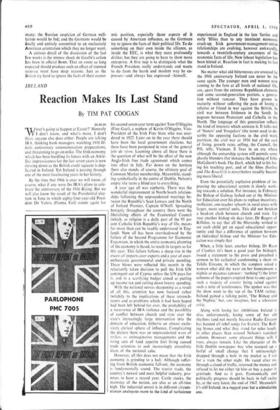The Germans Think Again
From SARAH GAINHAM
BONN
Tite difficulty about discussing German think- ing over NATO is that the Germans refuse to speak plainly about it. To the reluctance openly to criticise American policies is added a very strong wish not to fall out with the French.
Thus what the politicians are saying about General de Gaulle's demands on NATO is not necessarily what many of them are thinking. All parties in Bonn say with unusual agreement what Helmut Schmidt said to me a week ago: 'We do not need to do anything at the moment about General de Gaulle's note; we should wait until we know exactly what the French have in mind and then we can comment or negotiate.' Later in the same conversation the defence expert of the SPD—he dislikes the label—said that his party understood somewhat the French fear of being drawn into complications of American actions. In this he was thinking forward and for a German these were unusually plain words.
They were left in the shade by the public words of patriarch Konrad Adenauer at the CDU party congress last week. Dr. Adenauer's most serious pronouncements are often made—deliber- ately—in a startling or funny way. He said that Russian intervention in the Kashmir dispute had proved that Russia wanted peace, typically leav- ing out the end of the sentence and blaming the mistake, if it was a mistake, on the lighting in the hall. The rest should have been 'because they need peace.'
Just how much the Russians need peace on their westward borders is clearly shown by the confidential Moscow Central Committee letter to brother Communist parties in Eastern Europe, some parts of which were printed in Die Welt on March 21. Through the routine jargon-phrases, the careful reader can clearly see fear of war or a long-drawn-out border dispute of wasteful and expensive nature, with the Chinese. Do the Rus- sians really fear the Chinese, or do they prepare their allies for a startling change of foreign policy by exaggerating the Eastern peril . . .? For Western Europe it does not immediately matter. The important thing is that policy is changing for the only reason power-politics ever does change : because power has shifted.
The Bonn proposals for a seven-point relaxa- tion between Communist Europe and West Ger- many come at just the right moment, although that will not yet assure them a hearing in Moscow, or even, to judge from the first comments, a read- ing. They must have been some time in prepara- tion and the conjunction is partially chance—but a significant chance which shows that opinion is moving far ahead of public knowledge even in the hidebound atmosphere of Bonn.
The point is that things in Europe have changed and the Germans know it. Since the Americans themselves talk openly of the danger of war with China and a voice as weighty and respected as Walter Lippmann's has spelled out a warning in unmistakable terms, the taboo on discussion of global strategy is now absurd. A general war on the Asian mainland is possible for the United States in the next few years; such a conflict would be an historical disaster for the two main antagonists. For Europe, the danger then exists that Russia could not avoid being drawn in—at least to the extent that a very large defence effort to watch her eastern frontiers (where the Chinese
have claims) would involve a shift of military power in European Russia and Eastern Europe. The danger is not, as the Russians eternally re- peat. of hostility towards Eastern Europe but of mutual but involuntary involvement triggered by events so far away that they are not real to the general public anywhere in Europe. Thus it is not only the United States which needs a tacit agree- ment with Russia; Western Europe needs one, too, and the Russians equally need one with Western Europe. None exists; there is a potential power vacuum in Central Europe. It is not possible for the British to bridge this gap with any real effort of understanding because Britain is completely committed to the American point of view. The only other power in question is France. There- fore Germany. parts of which would inevitably be fought over in any trouble. must secretly wel- come French efforts to approach the Russians.
The immediate position of disintegration inside NATO must be seen, if Germany's real situation is to be understood, against the background of this global change. The point of NATO is that it should go into action at once, so that integration is essential. But for the larger need of trying to reach accommodation in Europe an independent France, still on terms of cordiality with her neigh- bours, is also required.
Yet where the French and the British attitudes coincide they are wrong; this is in their covert wish to return to a position of authority over Germany. It is misleading to expect to continue much longer any kind of tutelage or supervision over the Germans. Fundamentally, the two world wars were fought to change the position of Germany inside Europe; winning them did not effect this purpose and the policy cannot now be continued as an extension of war by civil means. Germany remains in the middle and is now, after incredible destruction, richer and more vigorous than ever. If France is the hinterland to German troops, so is Germany the Vorfeld for France and for all members of the alliance. The Germans are extremely conscious of their dan- gerous but potentially powerful position of being right in the centre, and the country that would have to be the battlefield has to be taken seri- ously if the battle is to be avoided.
Technically, the position of the Bundeswehr and France need not alter, for the storage depots and manoeuvre areas used by the Germans are already dealt with by bilateral agreements with the French. and with good will this arrangement could be negotiated to extend to French use of German areas. There is no valid reason why this method should not be used to cover permanent American installations in France, which the French no less than the Americans really want to have removed physically. Such depots and the like are under British sovereignty, at least in theory, in Britain and there could be a similar arrangement in France. The two major staff com- plexes are more difficult. SHAPE and AFCENT. The Germans would prefer them to remove to Brussels rather than to Northwood; for practical reasons—The Channel is still there' as a high German officer put it—as well as for psycho- logical reasons. But psychological reasons also inhibit the Germans from proposing the even more practical solution of removing them to Germany. This would increase rivalries between the allies, particularly between Britain and Ger-
many; the Russian suspicion of German mili- tarism would be fed; and the Germans would be finally and entirely committed to an exclusively American orientation which they no longer want.
A curious detail of the discussion of the last few weeks is the intense shock de Gaulle's action has been in official Bonn. That an event so long expected should produce such an effect of stunned surprise must have deep reasons. Just as the British try hard to ignore the facts of their econo-
mic position, especially those aspects of it caused by American influence, so the Germans try to ignore the facts of their political life. To do something on their own inside the alliance, as inside the EEC, is what they most profoundly dislike; but they are going to have to show more enterprise. A first step is to distinguish what the French President really understands and wants to do from the harsh and insolent way he ex- presses—and always has expressed—himself.



































 Previous page
Previous page